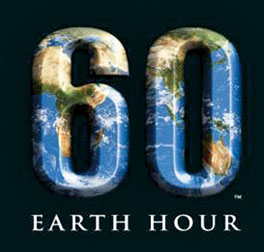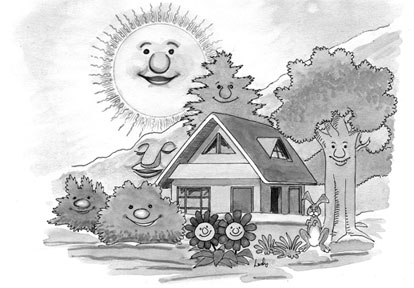Earth Hour came and went...
 The Worldwide Fund for Nature (WWF), formerly known as the World Wild
Life Fund created the ‘Earth Hour’ together with the Sydney Morning
Herald in 2007. The idea was to focus the world’s attention to the need
to conserve energy for the sake of ensuring the good health of the
planet earth and life in it. Almost all 2.2 million residents of Sydney,
Australia turned all non-essential lights and appliances that last
Saturday of the month of March and the event was a success. The next
year, on the same last Saturday of March, many other cities joined in
and the Earth Hour grew as an event and a somewhat important statement
on the need for urgent conservation action. The Worldwide Fund for Nature (WWF), formerly known as the World Wild
Life Fund created the ‘Earth Hour’ together with the Sydney Morning
Herald in 2007. The idea was to focus the world’s attention to the need
to conserve energy for the sake of ensuring the good health of the
planet earth and life in it. Almost all 2.2 million residents of Sydney,
Australia turned all non-essential lights and appliances that last
Saturday of the month of March and the event was a success. The next
year, on the same last Saturday of March, many other cities joined in
and the Earth Hour grew as an event and a somewhat important statement
on the need for urgent conservation action.
 Just last week, on March 26 from 8.30 pm to 9.30 pm was the
designated the Earth Hour 2011. It so happened, it was when most of
South Asia were watching the fourth cricket world cup quarterfinal
between Sri Lanka and England, played under bright floodlights of the R
Premadasa Stadium in Colombo. International Cricket Association (ICC) or
Sri Lanka Cricket (SLC) or for that matter, none of the sponsors or
organizers did not think it necessary to publicly request even a gesture
of support for WWF’s Earth Hour at the match. Just last week, on March 26 from 8.30 pm to 9.30 pm was the
designated the Earth Hour 2011. It so happened, it was when most of
South Asia were watching the fourth cricket world cup quarterfinal
between Sri Lanka and England, played under bright floodlights of the R
Premadasa Stadium in Colombo. International Cricket Association (ICC) or
Sri Lanka Cricket (SLC) or for that matter, none of the sponsors or
organizers did not think it necessary to publicly request even a gesture
of support for WWF’s Earth Hour at the match.
Comfort zones
My friend Daya Dissanayake, e-author and creator of www.sadu.com,
made a reference and a suggestion on a pre-event Facebook post in
support of those appealing for switching off unnecessary lights and
appliances. His was for the authorities in charge of cricket to consider
a similar feat at the match. He in return got several brickbats from
fellow Facebook bloggers. They suggested that we leave the cricket world
cup alone and look for other ways to conserve energy.
That got me thinking of the very interesting phenomenon of ‘give us
something comfortable to do, but don’t ask us to give away what we hold
dear and enjoy most’. This indeed is the dichotomy we all face today in
our quest for yearning for more and more. I myself realized that after
turning off my television for an hour in solidarity with my brethren in
conservation. I had missed some of the excitement created by Dilshan,
Upul Tharanga and the Sri Lankan cricket team, in winning what was a
rewarding match. I must confess that, that realization brought me a
sense of discomfort and am certain that most among you will even think
of me as a crackpot or mad man.
Planet’s health
The WWF together with several other environmental organizations and
climate change activists like UNEP, 350.org, tcktcktck.org, avazz.org,
ageofstupid.org also carved a niche with an attention seeking gimmicky
outcome on the calendar of environmental concern. It is true, that these
organizations attempt to do much to save the planet’s health on a daily
basis too. Significant amounts of funds are used-up, much research is
done and publications are made to shed light on issues and what are
thought of as solutions. Many seminars, conferences, workshops and media
events are held and the word that we must care for the health of Mother
Nature is spread around, much like the gospel.
Waging war
Activists young and old have joined-in for decades now to drive the
point home. There is much awareness about what is wrong and some among
us are even standing-up to take note. Leaders of the world meet, in the
cosy corners the likes of Davos (an epitome of simplistic living and the
ski-resort that it is, on the other extreme). They also meet in the big
cities, where they can travel back and forth, from the seemingly busy
schedules they have, making war and then making calls to douse the fires
that rage. Where then is the problem? We agree that there is a need to
seek ways to ensure that we do not create both the necessary and
sufficient conditions to trigger our own destruction. We, no doubt want
to do good. Yet, we want to be in our comfort zones when we do that.
This, I believe is where we need to take a ‘back to basics’ view of
the very core of our thinking. As we know them today, all social,
economic and business models we have are developed within the backdrop
of a structure of ethics that drive them. Ethics is defined as the
branch of philosophy that addresses questions about morality - that is,
concepts such as good and evil, right and wrong, virtue and vice,
justice, etc. It is important for societies, nations and the world at
large, from time to time, to revisit the basis of the ethical frameworks
on which its fundamental structures are built-on. Given the current
state of the world’s social, economic and environmental health, it is
perhaps opportune now, for us to focus on these very fundamental
premises.
Sufficiency economy
Asia and the Middle-East have been the germinating gene pool for
almost all of the great religions of the world. While we have often
unquestionably followed models of the dominant West, we have opted to
ignore the many lessons we could learn from the great religions on
self-sufficiency, frugality and on maintaining simple ways of life. We
forgot that Small is beautiful and that it is a term used to describe
the principles enumerated in ‘Buddhist Economics’ or the way to
successful living as described in the many teachings of the Buddha. The
orthodox Christian, Hindu and Islamic ways are no different. We have
heard of the principles of a Sufficiency Economy, a concept brought out
by the King of Thailand on the same thread of thinking. We sometimes
make fashionable talk of the efforts of the former King of Bhutan of his
country’s measure of development and success, through the national
economic indicator of Gross National Happiness.
 Regardless of what we have in our own belief systems and ethos in the
East, the Western world’s predominant stance of ‘Big is better’ has been
the driver of our greed-based lifestyle and business ethic through out
the modern phase of what is today, touted as ‘development’. Greed is
Good was in fact, a prominent signage I saw about a year ago, not in any
big city in the US, Japan or Europe, but in India very near the ashram
of the man who was the epitome of basic living, the Mahatma Ghandi. That
was in front of a modern shopping mall in Hyderabad during the
festivities of Id. Regardless of what we have in our own belief systems and ethos in the
East, the Western world’s predominant stance of ‘Big is better’ has been
the driver of our greed-based lifestyle and business ethic through out
the modern phase of what is today, touted as ‘development’. Greed is
Good was in fact, a prominent signage I saw about a year ago, not in any
big city in the US, Japan or Europe, but in India very near the ashram
of the man who was the epitome of basic living, the Mahatma Ghandi. That
was in front of a modern shopping mall in Hyderabad during the
festivities of Id.
The cost of placing greed before need is manifest everywhere and
around us in modern society. Over consumption, living beyond one’s
means, dependence on speculative wealth without real savings to back it
and the scant disregard to carrying capacities of the natural
environment are but some of these traits. We have often ignored the good
of the many in preference to those holding power and access to
resources. Offering unlimited choice over need and necessity is a
fundamental fault-line we need to track, in our social and economic
system of today.
Every drop counts
Increased incidence of polarised behaviour driven by intolerance and
greed has resulted in tensions never before seen. Terrorism is a
phenomenon we see emerging as a result and waging wars on terror over
the years have caused an enormous waste of resources both natural and
financial. These could otherwise have served to minimise poverty,
conserve water, other resources, manage causes for global warming,
prevent incidence of pandemics and to build trust among peoples to
eliminate causal factors that breed discontent.
The Earth Hour may have come and gone and Sri Lanka may get closer to
winning the Cricket World Cup this weekend. The need and the yearning
that leads us to want to participate in both events will continue to
trouble and bother us until we seek to resolve it within ourselves. It
must be the sum of many, making the collective. Never will it be the
other way around and every drop counts in making that mighty ocean of
the change we seek.
[email protected]
|



